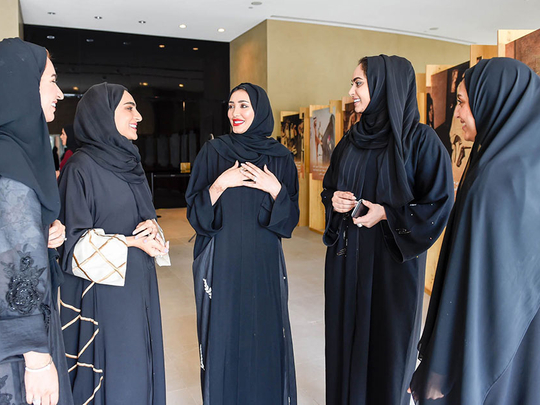
Dubai: The late Shaikh Zayed Bin Sultan Al Nahyan saw women as equal partners in the UAE’s growth, ensuring that this message was embedded in the minds of the young and old, prominent Emirati personalities said on Tuesday.
Ministers and women employees — including government and women leaders — gathered at the 4th Women’s Day Forum organised by the Dubai Electricity and Water Authority (Dewa) on Tuesday, to celebrate the achievements of Emirati women in all sectors and fields.
Hessa Buhumaid, Minister of Community Development; Mariam Al Mehairi, Minister of State for Future Food Security; and Saeed Mohammed Al Tayer, managing director and CEO of DEWA, attended the event at the Armani Hotel in Dubai.
At a panel discussion held under the theme ‘Women during Zayed’s reign’, the panellists shared their fond memories of meeting Shaikh Zayed at a younger age and how he inspired them to achieve and contribute to society. “When we look back at the reign of Shaikh Zayed, we also look back at our journey as a generation he directly invested in and was committed to supporting,” said Dr Amina Bou Chehab, a renowned Emirati writer and researcher.
“Shaikh Zayed visited us in school, ensured our welfare and showed confidence in our abilities. Women’s education, emancipation and empowerment were among his core priorities for the UAE,” Bu Shahab said.
Dr Rafia Ghobash, founder of the Women’s Museum, also recalled her first encounter with Shaikh Zayed as a school student and how he constantly pushed for girls’ enrolment in education. “I was among the lucky few who got to see him during his visit to my school. He asked us about the achievements of the Union, and I pointed out the hospitals and infrastructure — he was very impressed with that,” she recalled.
Dr Ghobash said Shaikh Zayed had a clear vision for women and did not want anything to hinder their march to progress. He facilitated this by giving incentives to families to send their daughters to school, and addressing the traditional beliefs held by the elderly and families.
“Whenever there were obstacles in the path to women’s empowerment, he wanted to overcome them. In the 1970s, he spoke to people with traditional mindsets about the value of educated women and of having mothers who could work and support their family,” said Dr Ghobash.
Thus, with shifting mindsets, Emirati women began actively and efficiently taking on all sorts of roles.
In his speech, Saeed Al Tayer emphasised Dewa’s role in women’s empowerment, so that they empower society as a whole and contribute to nation-building. Dewa, with 1,916 female staff employed in operations, 812 in engineering and other technical positions, empowers women both professionally and socially, Al Tayer said. Of its female workforce, 79 per cent are Emirati nationals.
“Women on the course of Zayed’ is a message that obliges us to follow in the footsteps of the late Shaikh Zayed. Since the UAE’s establishment, he believed that our society develops by empowering women, encouraging their participation and giving them opportunities,” he said.
Hessa Buhumaid said women’s active role in the UAE’s development would not have been possible without the support of Her Highness Shaikha Fatima Bint Mubarak, Chairwoman of the General Women’s Union, Supreme Chairwoman of the Family Development Foundation, and President of the Supreme Council for Motherhood and Childhood, “whose sustained patronage has had a significant impact on Emirati women and their achievements.”
Meanwhile, Al Mehairi said Emirati women today are shining role models in the Arab and Muslim world, and also internationally.







